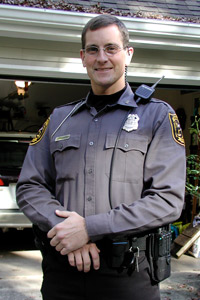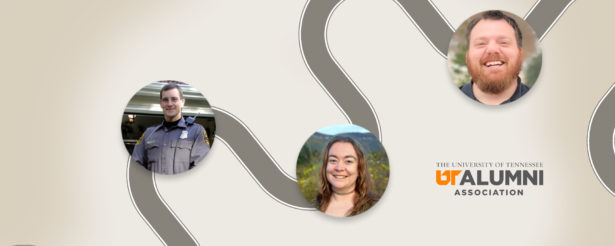
High-school teacher Richard Thompson (Chattanooga ’22) will say that teaching students algebra isn’t hard, but keeping a room full of them interested in algebra is extremely complicated.
However, Thompson’s previous career as a police officer provides a unique set of skills that he calls “absolutely invaluable” in his teaching career.
Thompson received his Master’s of Education from UT Chattanooga through the Job Embedded Program (JEP) in 2022. The JEP is a statewide program that allows individuals who already hold a bachelor’s degree to work as a teacher under a practitioner’s license while completing the Tennessee Department of Education’s requirements for teacher licensure.
Rachel Swafford-Cook (UT Chattanooga ’10, ’16), high-school principal, appreciates the backgrounds JEP teachers provide students. The teachers from the program often go into teaching subject matter from their previous careers, which lends itself to stories and examples in their classrooms. In Thompson’s classroom, a video of him being tased might not teach a math skill, but it certainly captures their attention.
For Thompson, his path began with a degree in electrical engineering from Georgia Tech to owning a fiber-optics company and most recently spending nine years as a police officer.
“I always enjoyed the teaching and training aspect of my previous careers, and it’s always something that has been an integral part of what I have done,” he says of why he went into teaching.
For Russell Spaulding (Knoxville ’20, ’22), he knew he wanted to teach and originally went to college to become a history teacher. However, Spaulding left school and began working in outdoor education. He spent eight years teaching people from ages 6 to 70 how to kayak, canoe, rock climb and more. Through that, a love for science ignited. Finding his way to UT Knoxville, Spaulding’s advisor helped him through the JEP, and he now teaches middle-school students his passion for science.
While the route to teaching science wasn’t direct, Spaulding wouldn’t change his time or experience as an outdoor educator.
“I wouldn’t have been able to fine tune my skills in communication and education that have made transitioning into teaching so much easier,”
he says, “That experience helped me because I already had my voice and tone control.”
On the administrative side, Swafford-Cook utilizes JEP teachers at her school because of the experience and the commitment they bring.
“Job-embedded people have decided that this is for them as far as helping kids and being a teacher,” she says, “They’ve chosen this, and that is really important.”
Administratively, the experience is the same as having a first-year teacher, although she mentions that the JEP students also come with the support from the university through their advisor.
As a student, Thompson found the advice from advisors helpful, as well as the ability to relate the education to his classroom.
“I could get real-world hands-on experience of how I might be able to work through an experience in my classroom and not just all theoretical,” he says.
Once he was in the program and teaching, Spaulding says the experience was phenomenal and recommends the JEP program to other working adults who feel teaching is what they want to do.
“Be willing to grow, and on the other side of the coin, be willing to fail some,” he says.

